首页 > 最新信息 / 正文

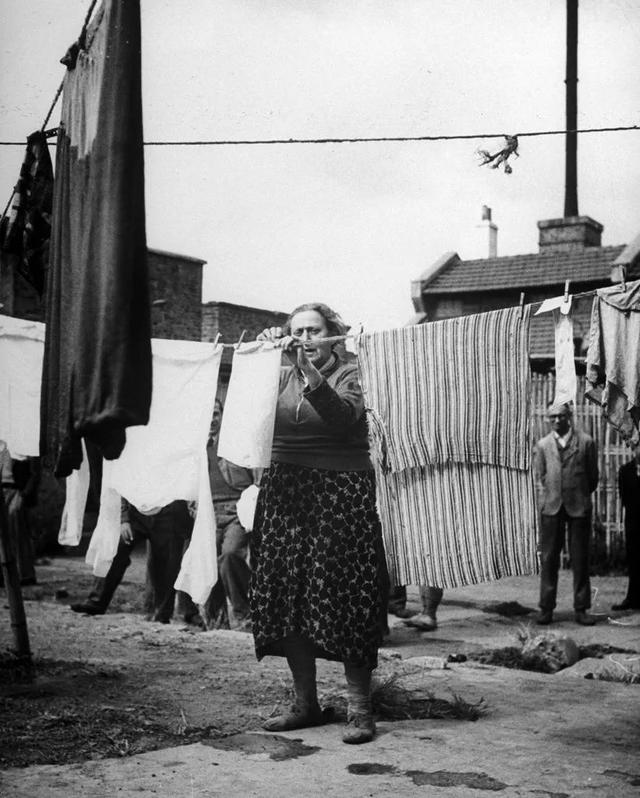
一名在虹口的难民,这里是欧洲犹太难民在上海的中心。 GEORGE LACKS/THE LIFE PICTURE COLLECTION, VIA GETTY IMAGES
Shanghai was the only option. That was what my parents discovered when they fled Hitler’s Germany. By the time they left, in separate journeys, they wound up in that international city in China, the last place in the world that would take in Jewish refugees.
上海是唯一的选择。我的父母在逃离希特勒治下的德国时发现了一点。他们各自取道离开,最终都到达了中国的这座国际都市,世界上最后一个愿意接收犹太难民的地方。
It felt a little like sailing to the end of the earth, my father often said.
我父亲常说,那感觉有点像是航行到了地球的尽头。
My parents became part of a community in Shanghai of some 18,000 European Jews who learned to live in barracks or crowded rooms, used chamber pots, sometimes ate only one hot meal a day from a communal kitchen and walked teeming streets filled with hawkers by day and, in the early hours, trucks picking up corpses. But they also had schools, cultural institutions and a thriving social life, complete with Viennese cafes. And they survived.
我父母进入了上海一个约1.8万欧洲犹太人组成的社区。他们学会了住在兵营或拥挤的房间里,使用马桶,有时一天只能在一个共用厨房里做一顿热饭菜,走在熙攘的街头,白天到处是小贩,清晨时分还会有拉运尸体的卡车。但他们也有学校、文化机构和繁华的社交生活,包括维也纳咖啡馆。而且他们还活着。
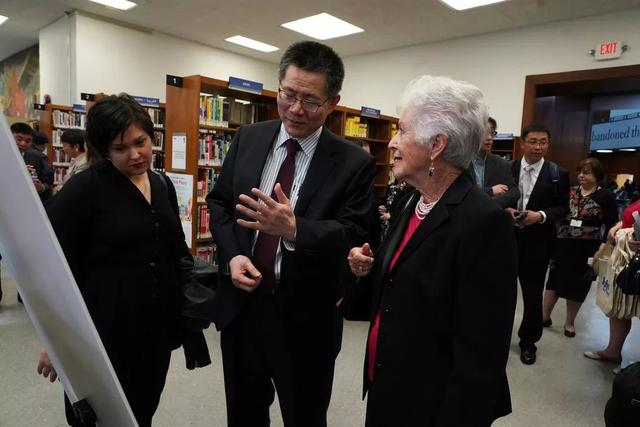
乔克林·伍德、弗兰克·徐和贝蒂·格里本希考夫在布鲁克林公共图书馆的“上海犹太难民”展览现场。 MICHELLE V. AGINS/THE NEW YORK TIMES
This fascinating, little-known and newly relevant bit of history is getting greater attention these days. “Hello Gold Mountain,” a chamber music composition inspired by the topic was performed in Nashville in February and hopes to tour New York. And most prominently there is a major project from the Brooklyn Public Library, “Jewish Refugees in Shanghai,” which brings an exhibition, films and other programs to four libraries through the month of May.
这些天,这段令人着迷、鲜为人知、近来有了话题性的历史片段,正引发越来越大的关注。2月份,受该话题启发创作的室内乐作品《同舟》(Hello Gold Mountain)于纳什维尔演出,并希望赴纽约巡演。最惹人注目的是布鲁克林公共图书馆(Brooklyn Public Library)的一个名为“犹太难民在上海”(Jewish Refugees in Shanghai)的大型项目,项目融合了展览、观影及四个图书馆的其他安排,将在5月持续一整月。
Frank Xu, the library manager who leads the project, grew up in Hongkou, the Shanghai district where Jews and Chinese lived side by side, and heard stories from his parents and grandparents. He realized that few Americans knew anything about it and thought that the “spirit of kindness” that permeated this unusual Chinese-Jewish bond could inspire a feeling of responsibility to help the refugee, when the very idea seems under attack today. “Others closed their doors,” he said. “Shanghai opened the door.”
领导该项目的图书馆经理弗兰克·徐(Frank Xu)在虹口长大——在上海的这个区,犹太人曾和中国人比邻而居——他从父母和祖父母那里听到了些故事。他意识到很少有美国人了解这段历史,他觉得,中国人和犹太人之间这条充满“仁善之意”的罕见纽带,或许会启发一种帮助难民的责任感,尤其是在这种观念正受到冲击的当下。“其他地方关上了门,”他说。“上海敞开了大门。”
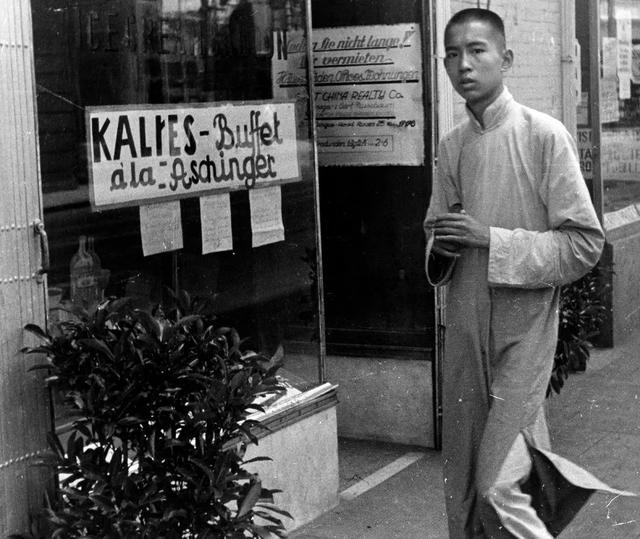
上海的一家德国餐馆,这里被认为是上世纪30年代欧洲移民的最后一个“自由城市”。 WOLFGANG WEBER/ULLSTEIN BILD, VIA GETTY IMAGES
My mother, named Ilse Ludomer at the time, arrived in Shanghai in 1939 at age 18 with her parents. The previous year, after the destructive rampage against Jews known as Kristallnacht, they had been forced out of their home, an apartment over the clothing store they owned, in the small German town of Koenigs Wusterhausen. They stayed with relatives in nearby Berlin and desperately searched for a way to escape Hitler’s rule.
我母亲当时名叫伊尔丝·鲁多默尔(Ilse Ludomer),于1939年18岁时随父母到了上海。之前一年,在被称为水晶之夜(Kristallnacht)的犹太人灭绝行动之后,他们被迫离开了家——他们在德国小镇科尼西-吾斯特豪森拥有的一套公寓,在一家服装店上面。他们在附近柏林的亲戚家住下,心急如焚地搜寻着逃离希特勒统治的路线。
My father, Erich Jacobsohn, already had a law degree in 1939, though he was forbidden by Nazi law to practice. He returned to his parents’ home in Stavenhagen, a tiny town in northern Germany, where he and his father were sent to a work camp after Kristallnacht. Other prisoners later went to Auschwitz, but Erich’s mother purchased the release of her husband and son from the Nazis before that happened. The parents then decided to send Erich away.
我父亲埃里希·雅各布松(Erich Jacobsohn)1939年已经拿到了法学学位,但纳粹法律禁止他从业。他返回了德国北部小镇施塔芬哈根的父母家,在那里他和他父亲在水晶之夜后被送到了劳动营。其他囚犯后被迁到奥斯维辛集中营,但埃里希的母亲事先得以把丈夫和儿子从纳粹手里赎回。父母于是决定把埃里希送走。
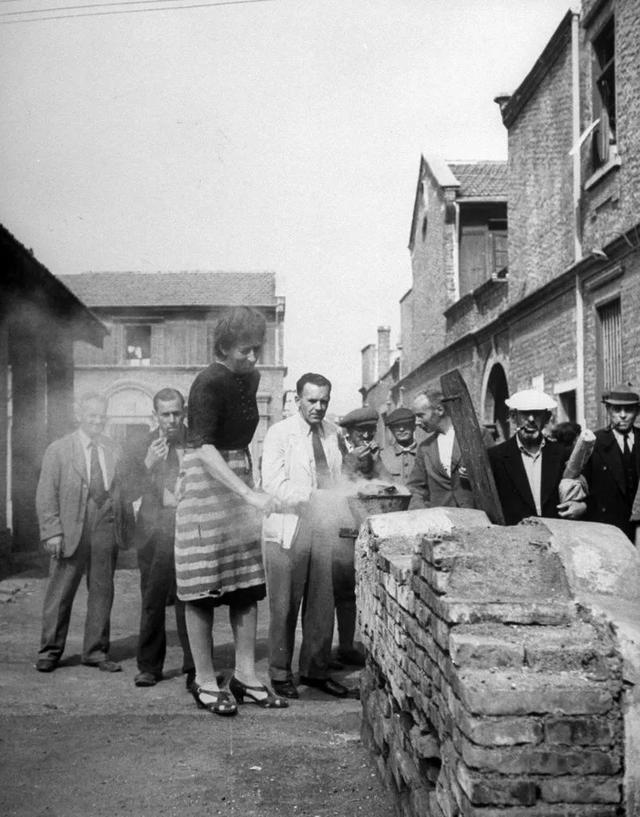
大约18000名欧洲犹太人住在拥挤的虹口一带,他们时常每天只吃一顿热饭,比如在这种炭炉上烹制的菜肴。 GEORGE LACKS/THE LIFE PICTURE COLLECTION, VIA GETTY IMAGES
And so Ilse and Erich, permitted only items like utensils, clothes and photographs and no more than 10 Deutschmarks, made their way to Italy, where they boarded ships bound for China. Shanghai had no visa requirements and, surprisingly, had a support system ready for them, largely financed by wealthy Iraqi Jews with British citizenship who had arrived centuries earlier. They created ways to house and feed the needy, a job later taken over by American Jewish agencies HIAS and the Joint Distribution Committee. Both my parents occasionally took advantage of the soup kitchen.
于是伊尔丝和埃里希都去了意大利,从那里搭上了前往中国的轮船,身上只带着几样被允许的物品:餐具、衣服、照片和不超过10个德国马克的现金。上海当时没有签证要求,而且出乎意料的是,竟然有现成的支援系统等着他们,那主要是由英国籍伊拉克犹太富人资助的,他们几百年前就来了这里。他们创建了帮助有困难的人解决食宿的途径,这项工作后被美国犹太机构希伯莱移民援助协会(HIAS)和联合救济委员会(Joint Distribution Committee)接管。我父母偶尔都会去施粥场领粥。
As it turned out, Ilse and Eric (who soon dropped the h from his first and last names) were among the more fortunate residents. Both were determined to enjoy their youths. My mother, quick to make friends, became her family’s breadwinner, waitressing in bars and restaurants. My father, who knew English, became a translator and English tutor. He also taught a British doctor’s son until 1943, when the Japanese occupiers interned foreigners and confined most Jews to the crowded square mile of Hongkou. My mother worked as a nanny. My father smuggled sausages.
结果,伊尔丝和埃里克(他不久便去掉了他姓和名里的字母h)属于较为幸运的居民。他们不打算让青春年华虚度。母亲善于和人打交道,靠着在酒吧和餐馆做服务生挣钱养家。父亲懂英语,做起了翻译和英语教师。他还给一个英国医生的儿子当家教,直到1943年,日本占领者扣押了外国人士,把大多数犹太人囚禁在虹口区一块面积约为1平方英里的拥挤片区内。母亲当时给人当保姆。父亲偷偷贩卖香肠。
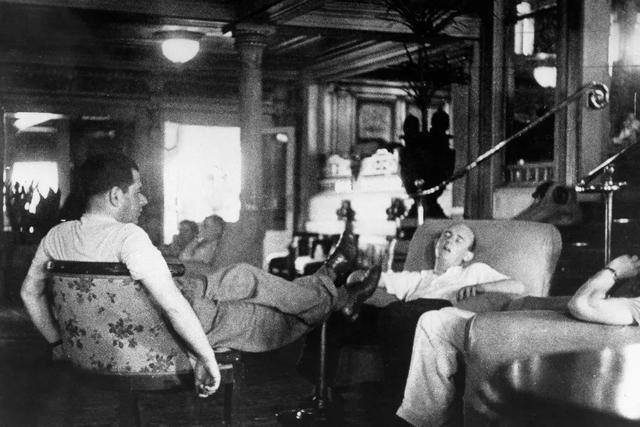
登上从意大利驶往中国的“罗索伯爵号”。 ULLSTEIN BILD, VIA GETTY IMAGES
It was a strange existence, tougher on some people than others. “Some previously important people collapsed,” said W. Michael Blumenthal, the U.S. secretary of the Treasury in the Carter administration and the founding director of the Jewish Museum in Berlin. He came to Shanghai from Germany with his parents in 1939 when he was 13 and left in 1947 — the same time span as my parents. “Others, who had little education, had inner resources and were willing to put themselves out there,” Mr. Blumenthal said in a telephone conversation.
这是一种奇怪的生活方式,其中一部分人的境况要格外糟糕一些。“一些以前位高权重的人崩溃了,”卡特政府的财政部长、柏林的犹太博物馆(Jewish Museum)创始馆长W·迈克尔·布卢门塔尔(W. Michael Blumenthal)说。1939年,13岁的他随父母从德国来到上海,1947年离开——和我的父母在同一时期。“还有一些人没受过什么教育,但他们有内部资源,愿意投身其中,”布卢门塔尔在电话采访中说。
“I chafed, of course, being young and feeling a sense of impotence, that no one would ever care about this miserable place,” he said. It provoked in him a desire to prove himself and to be successful, he said. “Secondly, it influenced my political views, caring for people who have nothing, who have no one to care for them.”
“当然,我很恼火,因为我还年轻,觉得自己无能为力,没有人会关心这个悲惨的地方,”他说。他说,这激发了他想证明自己并取得成功的欲望。“其次,它影响了我的政治观点,要关心那些一无所有、无人照管的人。”
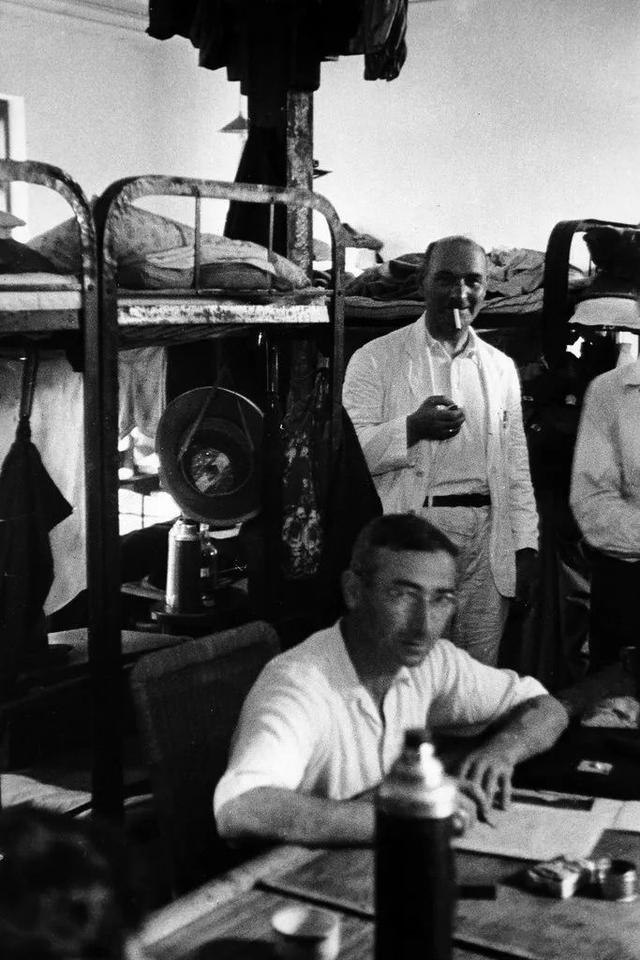
虹口的兵营内。 WOLFGANG WEBER/ULLSTEIN BILD, VIA GETTY IMAGES
Laurence H. Tribe, a Harvard Law School professor, a leading constitutional expert and an official in President Barack Obama’s Justice Department, also credited his direction in life partly to his years in Shanghai. These were very early years — he was born there in 1941 and left at age 6. His father, who as a young man had become an American citizen, was interned, he said, and young Larry recognized the injustice. “I thought, My father didn’t do anything wrong — why should he be in this place?”
哈佛大学法学院(Harvard Law School)教授、知名宪法专家、贝拉克·奥巴马(Barack Obama)总统的司法部官员劳伦斯·H·特莱布(Laurence H. Tribe)也说,自己的人生方向部分是由上海的岁月决定的。他出生于1941年,6岁时离开那里。他说,他的父亲年轻时就成了美国公民,当时遭到关押,年轻的拉里(劳伦斯的昵称。——译注)意识到了这种不公。“我想,我父亲没做错什么——他为什么会被关进去?”
Life in China seemed normal to many children, who attended a refugee school, said Lisa Brandwein, 83, who spoke at a library program. She lived in Shanghai from ages 3 to 12. “We went to school, we played,” she said. “But we sensed that our parents felt helpless.” Their Chinese neighbors, generally much poorer than the refugees, were always kind, she said.
83岁的丽莎·布兰德温(Lisa Brandwein)在一个图书馆项目中发言说,对许多在难民学校上学的孩子来说,中国的生活似乎很正常。她从3岁到12岁期间住在上海。“我们去上学,我们玩,”她说。“但我们感觉到父母很无助。”她说,他们的中国邻居通常比难民穷得多,他们一直都很善良。
Recounting the Shanghai Jewish story “is definitely a statement on the present refugee situation,” said Rabbi Sholom Friedmann, director of the Amud Aish Memorial Museum in Brooklyn, which recently had its own Shanghai exhibition and is a partner in the library’s project, along with the Jewish Refugees Museum in Shanghai. The Jews “managed to set up shop and become a community there,” displaying “strength, courage and resilience,” he said. “The Chinese made the Jews feel welcome. You don’t hear about the tension that you might hear about in other refugee situations.”
重新讲述上海犹太人的故事“肯定是对当前难民状况的一种陈述”,布鲁克林的火柱纪念馆(Amud Aish Memorial Museum)馆长肖洛姆·弗里德曼(Sholom Friedmann)拉比说。该纪念馆最近在上海举办展览,并与上海的犹太难民博物馆合作,参与了图书馆的项目。犹太人“设法在那里做起生意,成了一个社区”,展示了“力量、勇气和韧性”,他说,“中国人让犹太人感到自己被接纳。你听不到在其他地方的难民可能提起的那种紧张感。”
As for my parents, they finally met in Hongkou during an air raid drill in 1945, shortly before the end of the war. My father, who had moved into an apartment near the one where my mother lived, had already noticed her, he told me. He made sure to stand next to her in a bucket brigade and introduced himself. Their romance began. A year later, they married. The following year, I was born.
至于我的父母,他们在1945年的一次空袭演习中在虹口相遇,当时离战争结束已经不远。父亲当时搬到离母亲的公寓不远的地方,他告诉我,他早就注意到她了。在传递水桶救火的长队中,他特意站到她旁边,做了自我介绍。他们开始恋爱,一年后结婚了。第二年,我出生了。
Three months later, we were on a ship to America.
三个月后,我们登上了一艘去往美国的轮船。
作者:Aileen Jacobson
本文作者:海城吃喝玩乐(今日头条)
原文链接:http://www.toutiao.com/a6686607947948098055/
声明:本次转载非商业用途,每篇文章都注明有明确的作者和来源;仅用于个人学习、研究,如有需要请联系页底邮箱
- 搜索
-
- 05-29成王败寇,此人是失败者也被称为英雄,如今却坟墓荒凉
- 05-29开卷有益,朕不辛苦
- 05-29皇太极葬于昭陵,努尔哈赤葬于福陵,其先祖葬于?
- 05-29中国历史上的八大饭局 ▏国学文化精读
- 05-29夏商周三代是同时存在的,这三朝没有那么明确的朝代更替的概念!
- 05-29唐朝公主大多是国色天香,为何无人敢娶?公主一习惯让人难以接受
- 05-29张飞军旅生涯的凶险之战:激战五十多天,击败河北名将
- 05-29中国历史上最危险的三次战争,如果失败,传承可能会断代
- 05-29观察读史 | 林则徐重人情
- 05-29秦淮八艳之首的柳如是,愿和丈夫一同殉国,丈夫的回答成为笑柄
- 1000℃银河期货断剑之裔黑色金属衍生品日报_期货即时评论_财经
- 1000℃证金概念股行情火爆 但持仓数据赛雷猴淮南显示股股价多年低迷_财经
- 1000℃“特朗普鸡”现身白宫附近 原为山西一神话人物附身记工厂吉祥物|时事|太原|特朗普_视频
- 1000℃女子淘宝上花37元买到大牌项链觉得是假货,一蔡琰归时鬓已秋怒之下报案了…|淘宝|项链|施华洛世奇
- 1000℃小地鼠的花园政务要闻坚持标准 综合治理 一步到位|小区|耿彦波|要闻
- 1000℃公安部A级通缉重大涉黑有组织犯罪在逃人员耿建平落网|耿建终极螃蟹大战平|公安部|犯罪
- 1000℃全国半数地区个贷率超警戒线 多地收紧公积金政策_财colorcorrect.dlm经
- 1000℃山西全域旅游强劲发softupnotify.exe力|游客|旅游|景区
- 1000℃华联期货:环保停限产供应偏紧 焦煤有望震荡上涨|华联期永泽江里菜货_财经
- 1000℃政务要闻清徐县奇妙黑板画党建知识竞赛落幕|代表队|清徐县|知识竞赛
- 05-28雍正皇帝继位后,是如何扫清八旗宗室的“反对派”们
- 05-28曾经满洲地区的霸主好太王
- 05-28黄巾军起义对东汉产生了什么样的影响?汉朝又是如何末落的?
- 05-28中国历史上最牛的将军,长的太美战场上戴面具,死法太惨烈
- 05-27东北王张作霖:张学良之父,早年逃亡成匪,后称霸东北二十年
- 05-27他是历史上唯一一个文武双科状元,为何神秘失踪?他到底去哪了?
- 05-27诸葛亮去世后,为何会被后主刘禅持续报复29年?答案很简单
- 05-27赵匡胤没动一兵一将,只用一个黄包袱,就让他献上吴越十三州土地
- 05-27刘备三请诸葛亮,朱元璋一请刘伯温,刘备受点累,朱元璋却险丧命
- 05-27为了能“有后”,历代绝嗣皇帝都付出了哪些努力?佛系的汉昭帝
- 标签列表
-
- 太原 (401)
- 山西 (368)
- 历史 (217)
- 要闻 (179)
- 山西省 (171)
- 太原市 (137)
- 清朝 (82)
- 高铁 (82)
- 不完美妈妈 (76)
- 旅游 (76)
- 大大 (70)
- 我市 (67)
- 环保 (61)
- 京津冀 (59)
- 政务 (58)
- 明朝 (57)
- 经济 (55)
- 文化 (50)
- 环保部 (49)
- 西安 (49)
- 三国 (48)
- 高考 (46)
- 日本 (45)
- 政治 (44)
- 钢铁 (43)
- 政府 (43)
- 列车 (43)
- 脱贫 (42)
- 曹操 (41)
- 期货 (41)
- 旅客 (41)
- 督察 (40)
- 城市 (40)
- 煤炭 (40)
- 房价 (39)
- 空气质量 (39)
- 能源 (38)
- 房地产 (38)
- 新疆 (36)
- 铁路 (36)
